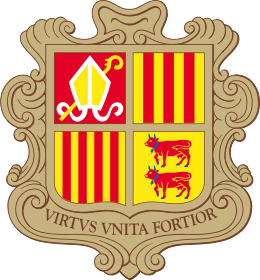Languages of Andorra
| Languages of Andorra | |
|---|---|
| Official languages | Catalan |
| Main foreign languages | Spanish, French and Portuguese |
| Sign languages | French Sign Language, Catalan Sign Language |
The following languages are currently spoken in the Principality of Andorra.
Catalan
Catalan is the only official language of Andorra.[1] It is also the historical and traditional language of the country used by government, television, radio, and other national media and is the main language of all the people living in the territory of Andorran nationality, who constitute 33% of the total population.
It is also the main language of about 25% of Spanish immigrants (who constitute 43% of Andorra's population), usually those who immigrated since 1985 from nearby Catalonia or Valencia.
Recently the Government of Andorra is enforcing the learning and use of the language within the immigrant labor force as a means to fully apply the constitution and overcome the issue of people living in a country without knowing its only native language. Despite vast incoming tourism from Spanish-speakers from Spain, both public and private signage in Andorra is mostly monolingual in Catalan.[2]
Andorra is the only country in which Catalan has official status in all of its territory.
Spanish and Galician
Spanish is the main language of about 70% of Spanish national immigrants (the remaining 5% speak Galician). Most came to the country between 1955 and 1995 from the traditionally less developed southern, western and central regions of the Iberian Peninsula (Andalusia, Extremadura, Castile-La Mancha, Murcia, Galicia etc.) and from those next to the Bay of Biscay (Asturias, Cantabria etc.).
The low degree of development of Andorra, the limited education in the immigrants' homelands, and the fear of an invasion by Spain during the Franco regime made it more difficult for the immigrants to integrate fully until 1993, when the constitution of the country was approved. Since then, Spanish has become the second most used language of the population living in the country,[3] and moreover is the dominant language of communication amongst people of different linguistic backgrounds — "the language of the street", thus triggering recent government efforts to promote more general and universal use of Catalan.[2]
Since Andorra also shares both Catalonian and French education systems, children can learn Spanish if parents choose the Catalonian option.
Portuguese
The traditional economic situation in Northern Portugal (mainly Norte) prompted a large migration flux to the country between 1960 and 1980, increasing the Portuguese population to 11% of the total, which added to a small community of Brazilians which migrated to Andorra in the 1990s has led to a present day lusophone population of about 13% of the country's total.
French
The nearby border with France, the reduced tax-free cost of living, and job opportunities in the thriving tourist industry have resulted in 7% of the country's total population being French nationals, mainly immigrants from Francophone Africa.[4] It is the main language of communication next to Catalan in Pas de la Casa on the French border.[2]
As with Spanish, children can be taught at school in the French language, if parents so choose.
References
- ↑ "Constitution of Andorra (Article 2.1)".
- ↑ 2.0 2.1 2.2 Molla, Guillem. "El català a Andorra: tota una lluita" (PDF) (in Italian). Universitat de Girona.
- ↑ "Tractaments protocul-laris". Estudi sociolingüístic del 2004 (in Catalan). Principality of Andora.
- ↑ "Departament d'Estadistica" (in Catalan). Princibality of Andora.
External links
- Ethnologue report for Andorra
- CIA – The World Factbook
- Departament d'Estadistica
- Tractaments protocul-laris
| |||||||||||||||||||||||||||||||||||||
| ||||||||||||||||||
